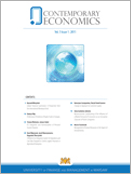The Impact of Governance Indicators on Corruption in Arab Countries
The Impact of Governance Indicators on Corruption in Arab Countries
Author(s): Hayder Abbas Drebee, Nor Azam Abdul Razak, Razzaq Thiab ShaybthSubject(s): Political economy, Accounting - Business Administration, Corruption - Transparency - Anti-Corruption
Published by: VIZJA University
Keywords: Corruption; Political Stability; Voice and Accountability; Regulatory Quality; Good Governance;
Summary/Abstract: This study aims to measure the impact of governance indicators on corruption in Arab countries during the period 2005-2016. Several techniques including co-integration, forecasting variance error decomposition, and impulse response function are employed. The results indicate that corruption is influenced by political stability, voice and accountability, and regulatory quality in both the short and long runs. The relative contribution of the change in regulatory quality to the change in corruption is weak, implying that there are weaknesses in laws, regulations and transparent legislation that determine the relationship between the state and the society and guarantee the integrity and rights of individuals. Therefore, fighting corruption needs to be an integral part of a comprehensive institutional and organizational reform strategy. This study is an important incentive for governments and global development organizations to improve governance performance to combat corruption. These governments may need external assistance that could be offered by the international development organizations to improve their indicators of good governance of corruption curb if Arab governments are not prepared to improve citizens' participation in this field.
Journal: Contemporary Economics
- Issue Year: 14/2020
- Issue No: 3
- Page Range: 354-365
- Page Count: 12
- Language: English

